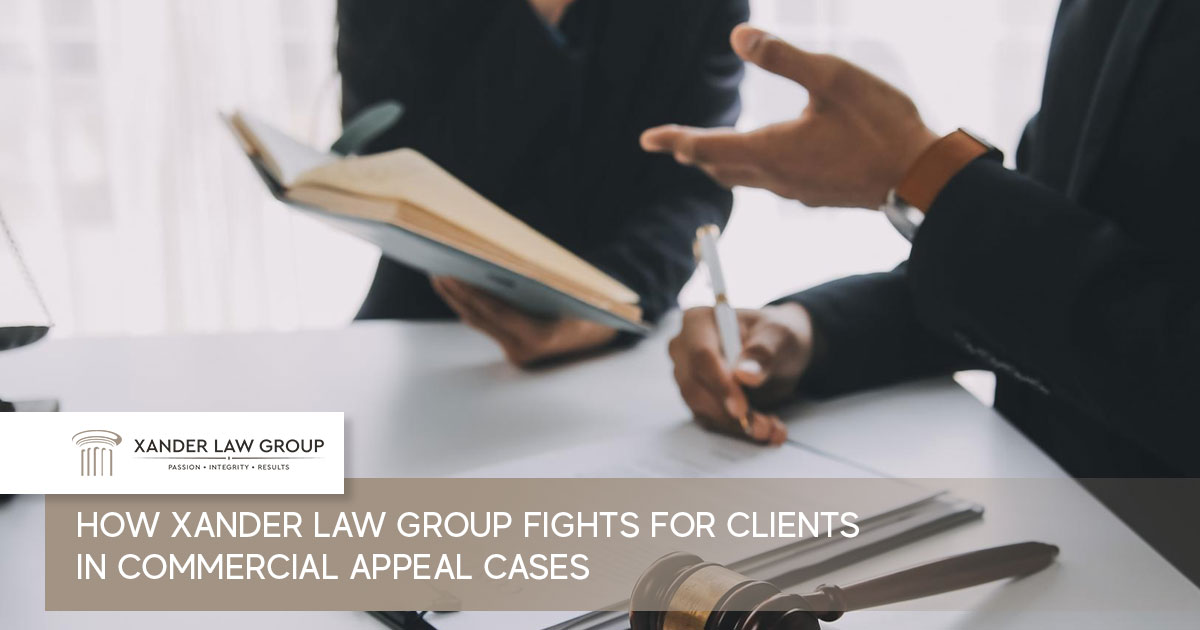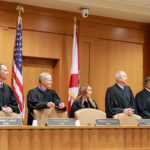How Xander Law Group Fights for Clients In Commercial Appeal Cases
In commercial litigation, the stakes are high. It is not uncommon for the very future of a commercial enterprise to rest on the outcome of the case it is litigating. If your business is in this position and your case has been unsuccessful, you need to act quickly to explore potential grounds for a commercial appeal. Pursuing a commercial appeal allows you to challenge the court’s decision and fight for a fair outcome for your business – but navigating the appeals process can be complex for the uninitiated. By developing a basic understanding of the appeals process and potential grounds for appeal, you’ll be in a better position to ensure that you exhaust all your legal options as you seek to protect your business’s interests.
Commercial Litigation 101
In brief, commercial litigation is the process by which two or more commercial parties seek to resolve a legal dispute between them by presenting evidence and legal argument to a court, which will then issue a judgment in one party’s favor. The most common types of commercial litigation disputes are contractual disputes, property disputes, intellectual property disputes, shareholder disputes, business torts and defamation, commercial fraud, and disputes concerning breaches of fiduciary duties by corporate officers.
However, whatever the subject matter of the dispute, the same basic process is followed: filing a civil complaint, exchanging evidence through the discovery process, strategically filing motions to challenge the evidence or argument presented by the opposing party, and examining witnesses and presenting legal argument to the court at trial. Once these stages are complete, the parties must wait for the court to issue its judgment, in which it will explain which version of events it has accepted (findings of fact) and which legal arguments it has found most convincing (findings of law). Once judgment has been granted, the parties to the proceedings have a limited time period in which to appeal the court’s decision. The party who appeals the court’s decision is called the ‘appellant’, and the party who is contesting the appeal and seeking to uphold the lower court’s decision is called the ‘appellee’.

The Commercial Appeals Process
If you have received a final ruling in a commercial litigation proceeding that you disagree with, it is imperative that you immediately contact a reputable commercial appeals attorney to discuss your next steps. In most cases, parties only have 30 days (calculated from the date of the lower court’s final judgment) to file a notice of appeal, so your lawyer will need to begin preparing your appeal as soon as possible after judgment has been granted. Note that certain judgments are not considered ‘final’: you will need to consult with a qualified commercial appeals attorney to determine if the judgment you have received is appealable. Appeals of judgments handed down by circuit courts must be handled by one of Florida’s six district courts of appeal.
Identifying grounds of appeal
First, your attorney will need to carefully scrutinize the court’s judgment to identify possible grounds of appeal. A commercial appeal is only available in cases where the trial court has made a ‘harmful legal error’ that has affected the outcome of the case. Every aspect of the judgment will need to be analyzed for errors that may give rise to an appeal. Common grounds of appeal that are raised in commercial litigation include:
- Errors of fact: for example, the court drew incorrect conclusions from the evidence presented to it, permitted the admission of evidence that was irrelevant, or unfairly excluded evidence that was relevant and should have been admitted
- Errors of law: errors of law occur when the trial court misapplies or misinterprets the law applicable to the case
- Errors of procedure: errors of procedure occur when trial has been procedurally unfair to one of the parties, for example, the court gave the jury incorrect instructions, or failed to address juror misconduct, or the judge failed to recuse themselves when a conflict of interest became apparent
To bring an appeal on one of the aforementioned grounds, an objection must have been raised during the trial proceedings and the error ‘preserved’. The error must have also affected the outcome of the case: immaterial errors do not give rise to an appeal.
Filing a notice of appeal
Once your attorney has identified that there are grounds to appeal your judgment, they will need to file a Notice of Appeal with the clerk of the court in which judgment was given. You will also need to pay a filing fee. The notice of appeal must be filed within the thirty-day time period stipulated in the Florida Rules of Appellate Procedure, otherwise your commercial appeal cannot proceed.
Preparing the appeal record
After the notice of appeal has been filed, your attorney will need to take steps to prepare the appeal record. The record is a compilation of all the legal papers and documents that were filed in the trial court. It also includes the transcript of the trial proceedings. Usually, the clerk of the circuit court will prepare the record according to your attorney’s instructions and charge a fee for doing so.
Filing briefs
This is the most critical step in any commercial appeal proceedings. Your attorney will need to draft a written brief that sets out all the legal arguments in support of your appeal. In many appeals, there is no hearing and no oral argument is presented, so it is very important that you hire an experienced commercial litigation attorney who will write a well-researched and highly persuasive brief to convince the appellate court to overturn the lower court’s decision. The appellant can request that they be given an opportunity to present oral argument to the court, but these requests are not always granted. If a hearing is held, your lawyer will need to make a concise, convincing argument to the judges hearing the appeal, and be prepared to answer any questions they raise concerning the merits of the appeal.
Appeal ruling
Once the court has had an opportunity to consider both parties’ briefs and any oral arguments presented, the panel of judges adjudicating the appeal will hold a conference and come to a decision. They may confirm or partially confirm the lower court’s decision, or reverse or partially reverse it. It may be several months until you receive an appeal ruling.

Trust Miami’s Leading Law Firm With Your Commercial Appeal
As the process above makes clear, commercial appeals is a complex area of litigation that requires years of experience to master. To give your business the best prospects of success on appeal, you need to hire a legal team that will meticulously research your potential grounds for appeal, prepare a comprehensive appeal record, and draft a well-written, persuasive brief arguing for your preferred outcome.
The commercial litigation attorneys at Xander Law Group routinely represent commercial clients in appeal proceedings, and have won numerous victories in complex commercial matters through their skillful, strategic approach to appellate litigation. When everything is on the line and your commercial appeal is your last chance to fight for your business’s interests, you want to be sure you have only the best commercial litigation attorneys in your corner.
Contact us today to arrange a consultation or find out more about our practice areas.









